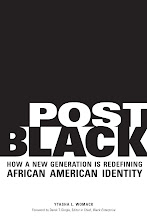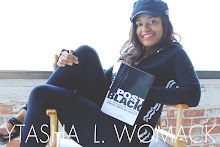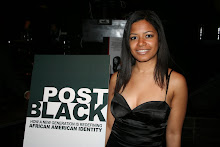Sergio Mims is a film critic and curator of the International Black Harvest Festival of Film and Video. He also moderated an intriguing discussion among filmmakers in the March issue of Ebony Magazine and hosts a classical musical show on WHPK FM in Chicago. PHOTO (l-r, Classical singer Micha Brunagosman and critic Sergio Mims)
YLW: How does one become a film critic?
SM: It's very simply a knowledge of movies and knowing how to talk about films in an intelligent way. When you have a knowledge of films you can compare films of a similar theme and genre. If you want to be a film critic, just start reviewing movies.
YLW: Why aren't there more African American film critics?
SM: I have wondered that and I have been asked that but I can only speculate. This could be controversial, but I'll say it anyway. Going back to the concept of Post Black, I think there may be a stigma attached to being a critic.
YLW: Really? How so?
SM: It's not cool. It's nerdy. There are still people who are resistant to the notion that you can be whatever you want to be. In other words, I think that being a critic is viewed as something that black people don't do. Nikki Giovanni says in this poem that “ my universe is five blocks.” Some people have a five block mentality. They feel you can only go so far.
YLW: So you're saying that there aren't more critics of color because it's not viewed as “cool?”
SM: Have you ever been around film critics? They're the nerdiest bunch you ever want to see. We think we're cool and sophisticated,but it's like being a computer geek. It's a nerdy endeavor.
YLW: You had an opportunity to moderate an intriguing panel with several black filmmakers including Lee Daniels, Antoine Fuqua, Bill Duke, Gina Prince Bythewood and Will Packer for Ebony Magazine. Were you surprised by any of their comments?
SM: The audience will be surprised to see these filmmakers and their understanding of the business, how it works and the realities. Anyone who's interested in filmmaking should read this article. People have a very pollyanna view of film. When you hear about the struggles Antoine Fuqua had making Brooklyn's Finest or Gina Prince Bythewood and The Secret Life of Bees. They were very eloquent and honest about it. It wasn't surprising to me, though..
YLW: Why would this be surprising to the audience?
SM: I don't think people have an understanding of what the film business is about. And too many filmmakers go into filmmaking not because they love films but because they like notoriety. If you love movies, you know it's a battle to get a film made. It's not about people making a fuss over you after the film is made. It comes down to 'I have a story I want to tell.' It's not about making a fuss or making money, or getting reviews but about telling a story to an audience.
YLW: Why is there a belief that filmmaking is purely about hype and celebrity?
SM: Every week now we read about box office numbers. This is a fairly recent thing. Before, nobody talked about box office receipts. That was something between the studio and the bean counters. If it did well, fine, if it didn't, no one knew. Everyone knows that Avatar is the biggest film ever made. Everyone sees the red carpet premieres. There always was a push of the glamorous side, but with all the media and websites, it's even more sold than ever. The glamor side is pushed more than any other. What isn't shown is the reality of the business.
YLW: I've interviewed other filmmakers and we've discussed how black films are expected to combat negative images of the past and make some form of social commentary. What are your thoughts on this?
SM: It's still a core belief. It's a wrong belief. Can you think of a black film or tv show that every black person praised? Everyone's going to find fault with something. No one movie or tv show can address all the ills and stereotypes that have appeared in the past 100 years and it would be foolish for any filmmaker to try to do that. All you can do is make your movie and hope people will like it. You can say there are some films that are better than others, or somethings that will represent blacks better than others. But no film can solve everything.
All we need are more black films to deal with black life and culture. That's what Black Harvest Festival of Film and Video does. Black life is very diverse. There is no definitive example of black life. No film can do that. In order to accomplish that, we need many, many more films. And even then there won't be enough. So stop jumping on one movie and feel this film will solve everything we're going through.
YLW: So what's next in film?
SM: In terms of film, you never know what's going to happen next. Who would have predicted Tyler Perry ten years ago? Who would have predicted that Spike's career would be on a serious downturn? Who would have thought Lee Daniels would be the filmmaker everyone is talking about? In terms of black film, what I have noticed, and this is really recent, in the last two or three years, I've seen more and more black filmmakers following their own voice.
SM: For a long time, people were trying to rip off what's hot. When gangsta rap was hot, you saw a bunch of knock offs or I saw a bunch of Tyler Perry rip offs. Following your own voice is the key. That's how you get A Good Day to Be Black and Sexy or Medicine for Melancholy or a Kenyan film shot in South Africa, called Pumzi. Not all, but it looks like filmmakers are saying why copy somebody else? What's important to me? What do I want to say?
YLW: What do you accredit this new diversity to?
SM: I think we're dealing with a whole new generation of filmmakers coming up and people just got tired of what they were watching. They said I don't want to see the same movie over again. This goes back to your whole Post Black concept, more filmmakers are of that ilk, saying I want to look beyond what we were doing or stuck doing, or break out of the box we were a forced in and stuck in. I want to break out. You have the Book of Eli by the Hughes Bros. Now, the fact that there was not one new thing in that film that was not taken from another film is one issue, but I'm happy that they did a sci fi. Why aren't more black filmmakers doing sci fi? A lot of African filmmakers are starting to do sci fi.
YLW: What's on the horizon in the film fest circuit?
SM: I'm very anxious. I'm putting together Black Harvest now. People are really finally doing interesting films. I see more of a range. I look at Night Catches Us, a period love story between two ex panthers. with Anthony Mackie and Carrie Washington at Sundance. That's interesting. A couple of years ago that would have been unheard of. I see a lot of movies out there that don't fit the mode. Films like Family, the black lesbian drama, and Black Dynamite. I think that's why we had the highest grossing fest last year, because there's so much diversity. A filmmaker has to challenge themselves. Spike tried a war movie, we see how that turned about, but he gets A for effort. Filmmakers try to explore some avenue of their talent. If you're an artist, you're supposed to take risk.The artists that I do know, they don't concern themselves with that, they do what they do. If people don't like it, that's their problem. There is no mode of what an artists should be, they don't care.
YLW: What are your thoughts on the Post Black concept?
SM: As far as Post Black, it's been happening for a long time. There have always been people who didn't fit the mode. I look at Ralph Bunch or Leontine Price or Paul Robeson, and these are just people we know. There have always been people who have been post black, who said do not put me in this box, I refuse to be put in this box. I think of Dean Dixon, one of the first internationally known symphony composers. I hate the idea of a definition of blackness. There is no definition of blackness.
YLW: You host a classical music show. How did you become a classical music lover?
SM: I just gravitated to it. My father listened to all kinds of music. When people say 'I listened to all kinds of music,' well they don't mean it. My father did and I fell in love with classical.
YLW: Was it rough growing up as a teen being a classical music fan?
SM: It ain't been easy. There's a mindset that if you're black this is what you're supposed to be and if you deviate from that from a fraction of an inch, they don't understand you. When I was in high school nobody was interested in what I was interested in. I was into foreign films and classical music. I took a lot of heat. Then when you get my age, people think you're a genius, some Einstein. I interviewed this classical singer Micha Brunagosman. We were there with friends and for two hours, most of it was the two of us talking about classical music. It was totally inside baseball. And at one point, one guy at the table said I have no idea what you're talking about. I've seen every orchestra in the world and if I wasn't in this, I would try to be a conductor. My classical music collection is astounding.
YLW: You are a person who created your own path.
SM: You can call me any name in the book. Twenty years ago, I would have cared. When you get older you don't give a rats ass anymore. You don't care what people think about you. Younger people are always thinking about what other people think about you. It's refreshing to not care. I look at the black gossip websites and I don't know who these people are. And I say, thank God, I'm not at at age where I have to know every new song and new person, which I never really did anyway.
You can read Sergio Mims' work on http://www.shadowandact.com/ and http://www.ebonyjet.com/




No comments:
Post a Comment